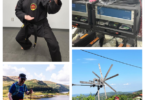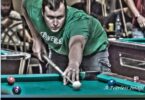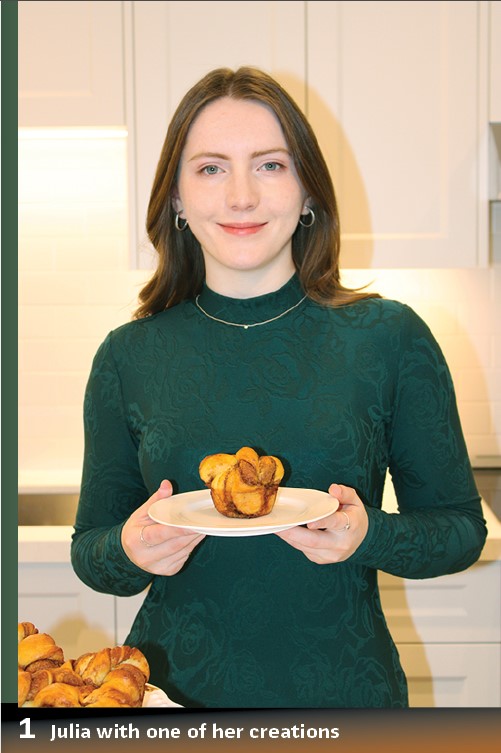
by Julia Wagner, Quanta Technology, Canada
How did I get started?
I began baking as an activity with my mum when I was very young. I remember even when I was as young as five, she would allow me to help her make peanut butter cookies or cupcakes, specifically the boxed Betty Crocker Cherry Chip cake mix variety. I enjoyed baking even back then, and at one point, I began to bake on my own. Over time, I became the go-to person in my family to make dessert for a family celebration or treats for a class party. There were a few years when baking became less of a focus for me, and I invested more time in hobbies like drawing and painting. However, midway through high school, I returned my attention to baking. Since then, I have been enthralled by consistently developing my baking skills and learning new recipes.
Why do I do it?
One of my main motivations for continuing baking is the satisfaction of learning a skill. There are a vast number of techniques to learn related to the multitude of different baked goods out there. I love the feeling of accomplishment when I successfully pull off baking something for the first time. I continue to feel curious about how to make challenging recipes, which has pushed me to figure out how to create intricate cakes, macarons, eclairs, entremets, and many other desserts.
Beyond the personal accomplishment I get from improving at baking, I feel fulfillment from being able to share the results of my hobby with others. I believe that I have devoted so much time to baking over art because of how easily I can share something I have baked with a group of people. It brings me a lot of joy to hear how someone enjoys my baking or when my family compliments me by calling me a “konditor”, which is German for a pastry chef. Especially in power systems, where we may not get positive feedback consistently from the populations we try to help with our work, I appreciate hearing that I have brightened someone’s day with something I have done, even if that is just through providing them something I have baked.
What is my approach?
I have a loose process that I regularly use when I am getting ready to bake. I have developed this process and come across these baking tips over the years that help me consistently achieve good results.
Find a recipe – Any time an idea comes to mind of a baked good I am interested in making for the first time, I add it to a list. Once I have the time and motivation to bake a list item, I search online for a few recipes with lots of reviews and high ratings. I compare the recipes to see the ingredients and equipment needed for each one. This gives me an idea of which ingredients are necessary for flavor and structure, the various tips different bakers have, and if I can simplify any steps in the process.
Buy my ingredients – The time of year often informs my recipe choices, partially due to the ingredients available. Some recipes call for specialized ingredients, and I may have to visit high-end or specialty grocery stores to find these ingredients. I do not like to make a lot of substitutions when baking to ensure I am getting the correct final textures and flavors. If you need to make substitutions, research well-known and widely accepted substitutions.
Gather my equipment – Certain baking equipment is needed to prepare each recipe. Several pieces of equipment that I use over and over are:
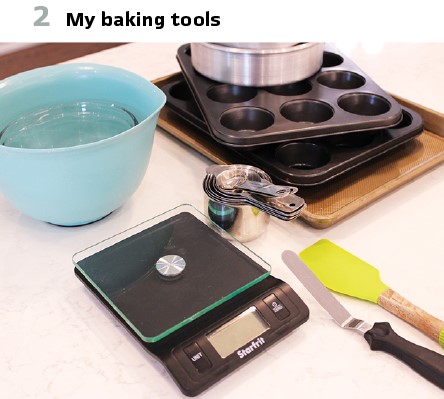
- Multiple sizes of mixing bowls: most recipes require a medium and large mixing bowl. I have silicone and glass bowls; silicone is easy to clean, and glass can be heated safely
- Kitchen scale: I use a scale to measure most of my ingredients rather than measuring cups. The scale allows for more accurate and faster measuring, and all I need to do to measure is pour ingredients into a bowl
- Measuring spoons and cups: I use the measuring spoons for accuracy with small amounts (less than a tablespoon or so). Measuring cups are used if I cannot easily find a conversion from volume to weight for a specific ingredient
- Stand mixer or hand mixer: I get a lot of use out of both my stand mixer and hand mixer. I find the hand mixer can be much more efficient for whipping up a bowl of egg whites or heavy cream, or creaming butter and sugar for small cookie batches. If I know that the recipe will require mixing for very long periods, I will spare my arms from the effort and use my stand mixer
- Spatula: I have a good rubber spatula for transferring batters from bowls or folding ingredients
- Trays and pans: My collection of pans and trays consists of round layer cake pans, cupcake pans, glass pie dishes, a torte pan, and several large cookie sheets. These allow me to make a wide variety of desserts
- Palette Knife: I love my offset cake palette knife for helping me smooth the top layer of frosting on a cake or the batter in a pan
- Piping tips and bags: I have a variety of piping tips for making detailed designs when decorating cakes, cupcakes, and cookies

Making the recipe – I follow recipes closely to achieve the best results. Many online recipes have accompanying videos that provide more insight into the techniques used and what the dough or batter should look like at various stages. My experience allows me to know what small changes to a recipe I can get away with. If I want to use less or more sugar, salt, or vanilla to change the final flavor slightly, that will likely not cause an issue. However, many ingredients, like flour, baking soda, and baking powder, will prevent your baked goods from turning out even if changed slightly. The most common baking mistake I see is too much flour being added to cookies, resulting in the cookies not spreading (flour needs to be fluffed before being put into measuring cups otherwise you will use too much flour. Measuring with a scale allows you to skip this step). Another concern I have at this stage is overmixing, especially once flour is incorporated. I try to mix no more than what is specified in the recipe. Once everything is mixed, it goes into the appropriate pan and then into the oven. I will regularly turn the oven light on to check the progress of what I’m making, to ensure that everything is rising as expected and not burning.
Plating and photos – When the baked item is out of the oven, out of the pan, and cooled, I work on presentation. There may be additional steps like doing decorative icing or adding details such as garnishes to wrap up the baking part of the process. With that done, I take photos to document my progress in learning new baking skills. Food photography has become another hobby I am trying to improve on since I want the photos of my baking to fully reflect the beauty of the real thing.
Eating – One of the best parts about my hobby is that I often get to try the final product. I especially enjoy this part as I am usually with my family and friends, finally tasting the treats I have put so much effort into.
How did I get better at baking?
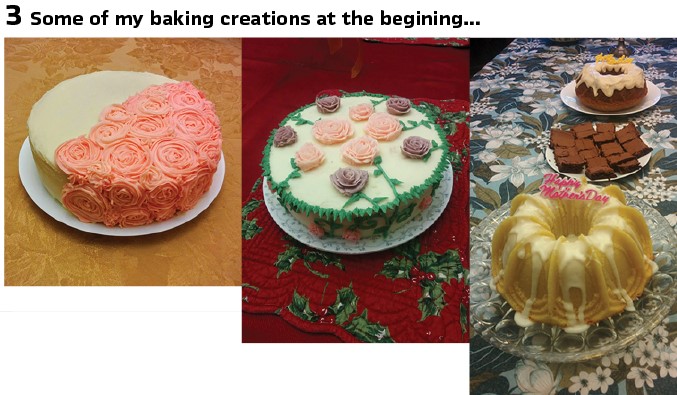
I have thought a lot about what has allowed me to get to the skill level I am currently at with my baking. I have realized there are key steps I used to improve, and I hope that others can use these to understand how they can become better bakers.
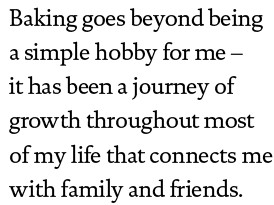
Identify what is not known – I pay attention to a lot of media related to baking to discover baked items that are new to me. I then investigate the skills necessary to make these items and figure out what I am unfamiliar with or need to practice. I keep these gaps in my abilities in mind and try to select recipes that will help me learn.
Get a mentor – I had a high school teacher who had her own baking business that became my baking mentor. She ran a Cake Club for students after school that taught me the basics of baking a cake, whipping up buttercream icing, cutting the cake to get even layers, frosting the cake for smooth sides, and piping floral designs onto the cake. The knowledge I gained from that mentorship unlocked another level in my baking, and I now draw upon that experience every time I make a cake.
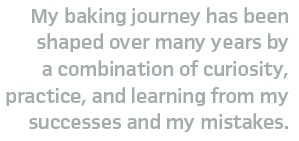
Practice and learn from mistakes – Since my high school Cake Club days, I have made many cakes. Each time, I go through the process of baking the cake, making the icing, and decorating the whole thing. There has been a fair share of those cakes that did not turn out. Whether they burnt in the oven, could not be removed from the pan, or my designs were visually disappointing, I would get past the feelings of frustration and try again. This is how I approach all my baking; I keep trying again to get it right. I use these failures to understand what to avoid doing in the future and will keep these details in mind for the next attempt.
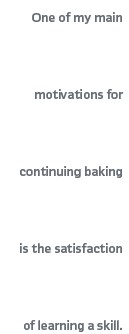
Research and invest – When I make mistakes or find a recipe that is consistently not turning out right for me, I do a lot of searching online for troubleshooting baking issues. I often ask myself, “Could a problem I am having be solved by having different baking equipment?” Investing money in buying proper baking tools (especially the equipment I mentioned earlier) can make a massive difference in the final result.
Confidence as skill set increases – As I have become more experienced with baking, I am willing to try difficult recipes because of my confidence that I can find a solution to most baking problems I encounter. I know it may not be easy, but I improved my baking abilities significantly this way.
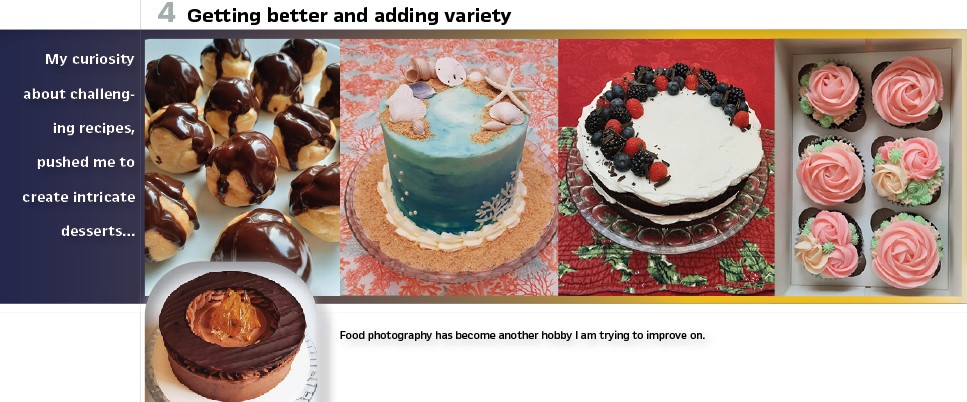
How are baking and engineering connected?
The initial view of baking is that it is not similar to engineering. It allows time to unwind from the technical aspects of working within the field of protection and control; a time to let the creative part of the mind take over. However, looking at my process for getting better at my hobby, I see obvious parallels between baking and engineering. Identifying what we do not know is part of engineering projects when we figure out what parameters of a project need to be specified to go forward. Mentorship is a method of passing on engineering knowledge between generations, and we rely on experienced engineers to provide relevant advice and insights.
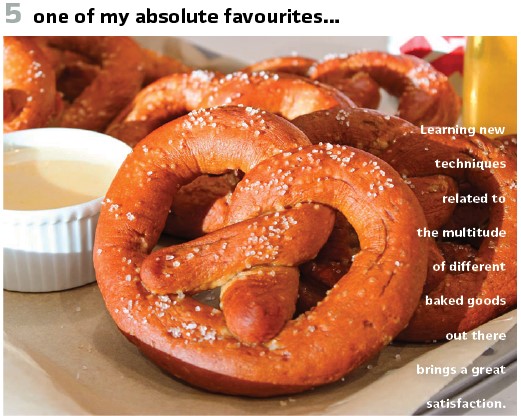
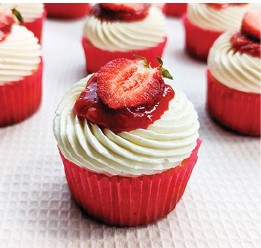
All engineers make mistakes, and it is a great tool to recognize these missteps and understand how to avoid them in the future, as these mistakes may have the potential to cause harm to others. When we started our journeys in engineering, we researched fields to study and invested in our education. We research emerging technologies and invest in tools to make systems more reliable, efficient, and safe. The more experience we have, the more confidence we feel in our ability to take on increasingly complex projects and continue to push the field of engineering forward.
My baking journey has been shaped over many years by a combination of curiosity, practice, and learning from my successes and my mistakes. I have grown as a baker utilizing many of the methods for becoming a better engineer, which shows me that others in the engineering community have the potential for success with baking. I encourage you to challenge yourself to bake something unfamiliar; I know that no matter what, you will learn a great deal from the experience!
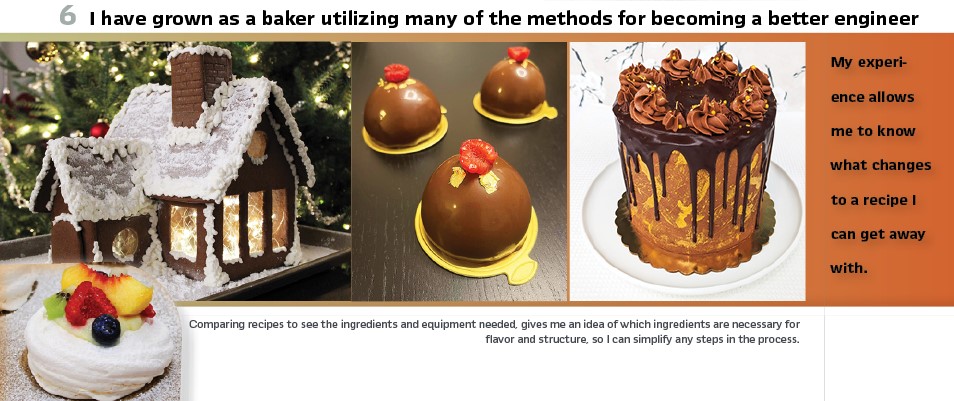
Biography:

Julia Wagner is a Consultant at Quanta Technology in Monitoring, Protection, Automation, and Control based out of Toronto, Canada. Julia’s areas of focus are power system equipment testing, network testing, relay setting development for reliability improvements, and automated tool creation for short circuit programs. Prior to joining Quanta, Julia worked at Hydro One Networks Inc. in protection and control engineering, Bell Canada in radio network engineering, and Trench Ltd. in strategic procurement for instrument transformer manufacturing. In 2023, Julia graduated from the University of Toronto with a BASc and is currently pursuing a MEng in Electrical Engineering.


